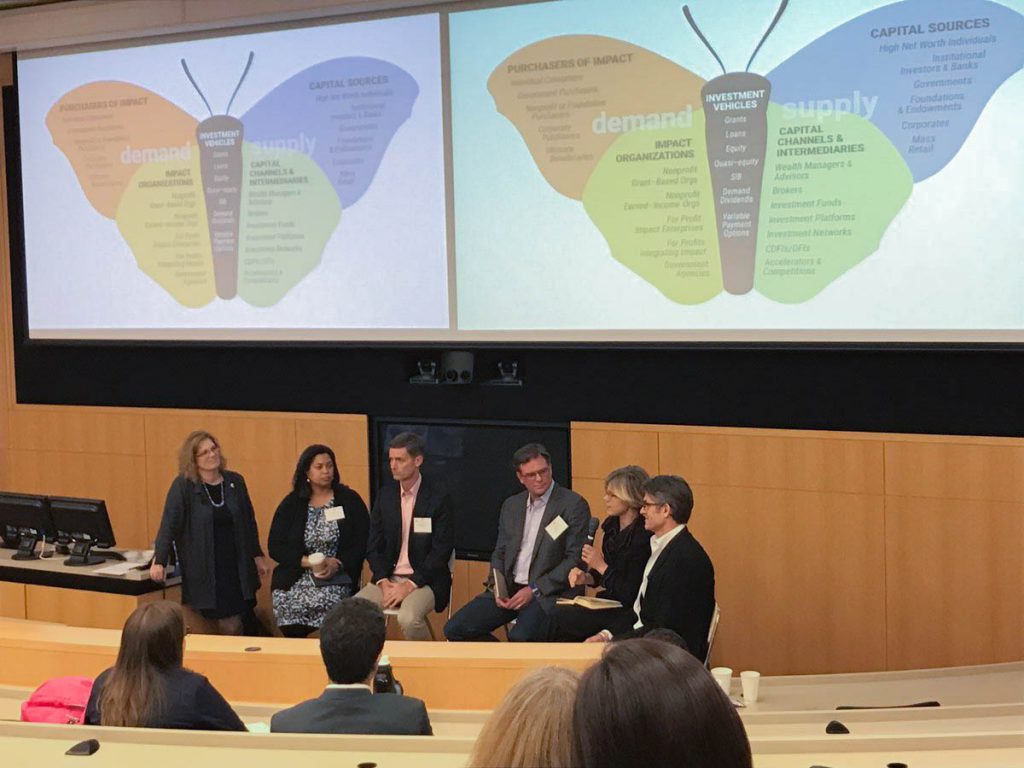This post was written by Raquel Lima, a second-year MBA student at The Fuqua School of Business. This year’s Sustainable Business and Social Impact (SBSI) conference focused on how business can tackle global challenges by exploring innovative models and collaborative partnerships that are already working to solve these challenges and discussing how these solutions can be scaled across industries and geographies.
Want to be the first to know when SBSI18 tickets go on sale? Sign up for the CASE Newsletter!

More frequently than ever individuals and institutions are demanding investment in opportunities that will have a positive impact in society and the environment. This sounds like the dream come true for professionals in the field of impact investing: those responsible for the supply of capital are now asking how they can be part of the growing movement of responsible investing.
Not so fast though! The field of impact investing is still relatively young compared to traditional investing and there has been lots of learning and innovation in the space in the past few years. The reality is that impact-investing professionals are still figuring out the best way to allocate funds while meeting clients’ demands for impact and financial returns.
During the SBSI17 conference, a panel of wealth advisors and intermediary investors, moderated by Professor Cathy Clark, shared their thoughts and experiences in working to meet their clients’ demands in impact investing. Below are the key takeaways from this discussion:
There is still a lack of education in the space
In one end, the suppliers of capital are generally not very clear on their investments goals and objectives when it comes to impact investments. They are often skeptical about potential financial returns associated with these investments, which keeps them from taking action. On the other end, some financial advisors (the “gatekeepers”) aren’t yet making use of all the tools available to make recommendation on how to optimally allocate a portfolio to include impact investments that are in line with their clients’ preferences for impact and financial returns.
Cognitive dissonance gets in the way!
In simple terms, cognitive dissonance is a state of conflict in the mind, when an individual has two opposing views at the same time. How does it relate to impact investing? Individuals struggle with the idea of achieving market returns and making impact at the same time. In investors’ mind, these are two contrasting concepts: “Either I make impact and don’t achieve returns, or I achieve returns and don’t make impact.” Cognitive dissonance is uncomfortable and holds capital suppliers and intermediary investors back from realizing that financial returns and impact do not need to be opposing ideas.
So, how can we overcome these hurdles?
We are getting there! Impact investing professionals and thought leaders have been working hard to lessen the gap in education. Many white papers have been published to prove that it is possible to achieve market level returns in impact investing. These white papers increase awareness in the field, educate those individuals and institutions that supply capital, and help them to get comfortable with the concept of returns and impact (at the same time!). Moreover, many large financial institutions are now integrating ESG (Environmental, Social and Governance) goals in their private wealth advising process. These financial institutions are also creating standardized ESG products to meet capital suppliers’ demands for impact in their sectors of preference.
The panel at SBSI was composed of a set of professionals that are extremely passionate and committed to advancing the field of impact investing. In my opinion, passion and commitment is really what will help us overcome these hurdles and take the field of impact investing a long way!
A special thanks to our panelists and moderator:
- Eric Savage – Co-Founder & CEO; Unitus Capital
- Matthew Weatherley-White – Managing Director & Owner; The CAPROCK Group
- Tom Mitchell – Managing Director; Cambridge Associates
- Jackie VanderBrug – Managing Director; US Trust
- Lisa Hall – Managing Director; Anthos Asset Management
- Cathy Clark, Adjunct Professor; Duke University’s Fuqua School of Business. Founder & Director; CASEi3 Initiative on Impact Investing
About Raquel Lima:
 Raquel Lima is a second-year MBA student at Duke’s Fuqua School of Business. At Fuqua, Raquel has shown her dedication to the impact space by taking on leadership roles as a CASE and CASE i3 Fellow, co-chair of community outreach for the Net Impact Club, and as volunteer with the refugee community in Durham. Raquel is very passionate about social entrepreneurship as a catalyst for change in communities in need, and capital enablement of these enterprises though impact investing. Prior to Fuqua, Raquel worked in the Realty Management Division at Goldman Sachs, and as a market analyst at the boutique consulting firm Precision in Dallas, TX. She has also spent time working in Nairobi, Kenya for Sinapis Group, a social enterprise that supports entrepreneurs through business training and consulting services.
Raquel Lima is a second-year MBA student at Duke’s Fuqua School of Business. At Fuqua, Raquel has shown her dedication to the impact space by taking on leadership roles as a CASE and CASE i3 Fellow, co-chair of community outreach for the Net Impact Club, and as volunteer with the refugee community in Durham. Raquel is very passionate about social entrepreneurship as a catalyst for change in communities in need, and capital enablement of these enterprises though impact investing. Prior to Fuqua, Raquel worked in the Realty Management Division at Goldman Sachs, and as a market analyst at the boutique consulting firm Precision in Dallas, TX. She has also spent time working in Nairobi, Kenya for Sinapis Group, a social enterprise that supports entrepreneurs through business training and consulting services.
